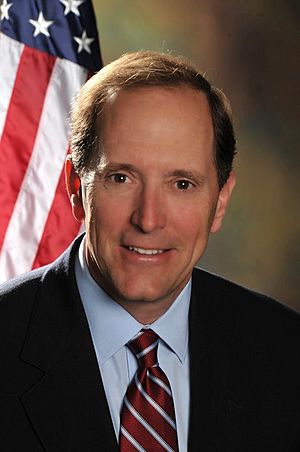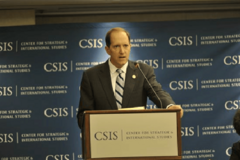Dave Camp facts for kids
Quick facts for kids
Dave Camp
|
|
|---|---|
 |
|
| Chair of the House Ways and Means Committee | |
| In office January 3, 2011 – January 3, 2015 |
|
| Preceded by | Sander Levin |
| Succeeded by | Paul Ryan |
| Member of the U.S. House of Representatives from Michigan |
|
| In office January 3, 1991 – January 3, 2015 |
|
| Preceded by | Bill Schuette |
| Succeeded by | John Moolenaar |
| Constituency | 10th district (1991–1993) 4th district (1993–2015) |
| Member of the Michigan House of Representatives from the 102nd district |
|
| In office January 11, 1989 – January 3, 1991 |
|
| Preceded by | Michael D. Hayes |
| Succeeded by | James R. McNutt |
| Personal details | |
| Born |
David Lee Camp
July 9, 1953 Midland, Michigan, U.S. |
| Political party | Republican |
| Spouse | Nancy Camp |
| Education | Albion College (BA) University of San Diego (JD) |
David "Dave" Lee Camp (born July 9, 1953) is a former American politician. He was a member of the United States House of Representatives for the state of Michigan from 1991 to 2015. The House of Representatives is one of the two parts of the U.S. Congress, which makes laws for the country.
As a member of the Republican Party, Camp became the chairman of a very important group called the House Committee on Ways and Means. This committee is in charge of laws about taxes, trade, and social programs. In March 2014, he announced he would not run for re-election and would leave Congress.
Contents
Early Life and Education
Dave Camp was born and grew up in Midland, Michigan. After graduating from H.H. Dow High School in 1971, he went to college. He studied at the University of Sussex in England for a year. He then earned his bachelor's degree from Albion College in Michigan.
To become a lawyer, he went to the University of San Diego School of Law and earned a law degree in 1978. For over ten years, he worked as a lawyer in his hometown of Midland.
In 2012, doctors found that Camp had a type of cancer called lymphoma. He went through treatment and announced he was cancer-free later that year.
Getting Started in Politics
Before being elected to Congress, Camp was active in local politics in Midland County. He worked for the Michigan attorney general's office for four years.
Later, he worked for his friend, U.S. Representative Bill Schuette. This experience helped him learn about how the government works. In 1988, he was elected to the Michigan House of Representatives, where he served for one term before deciding to run for the U.S. Congress.
Serving in the U.S. House of Representatives
In 1990, when Bill Schuette decided to run for the U.S. Senate, Camp ran for his open seat in the House of Representatives. He won the election and began serving in 1991.
Camp was re-elected many times over the next 24 years, usually winning by a large number of votes. He represented the people of Michigan's 4th congressional district.
Important Work in Congress
During his time in Washington, D.C., Camp worked on many different issues. He was a member of several committees, which are small groups of representatives who focus on specific topics.
- Agriculture: Early in his career, he served on the House Committee on Agriculture. He worked to support farmers in Michigan and across the country.
- Homeland Security: After the September 11, 2001 terrorist attacks, Camp helped create new policies to protect the country's borders.
- Taxes and Health: As a member of the powerful Ways and Means Committee, he helped write laws about taxes and healthcare. He eventually became the chairman of this committee, which gave him a big role in shaping the nation's laws.
- Helping Children: Camp introduced bills to help children in foster care find permanent homes through adoption. One of these bills, the Promoting Adoption and Legal Guardianship for Children in Foster Care Act, became law.
Committee and Caucus Roles
A committee is an official group in Congress that works on laws. A caucus is an informal group of members who share an interest in a certain topic.
Key Committee Assignments
- Committee on Ways and Means (Chairman)
- Joint Committee on Taxation (Chairman)
- Joint Select Committee on Deficit Reduction
Caucus Memberships
- International Conservation Caucus
- Sportsmen's Caucus
- Congressional Cement Caucus
Political Views
Camp described himself as a "conservative on fiscal policy," which means he generally supported lower government spending and lower taxes. He was a member of the Republican Party and usually voted with his party on most issues.
He supported major trade agreements like NAFTA and CAFTA-DR. He also voted for tax cuts and supported the wars in Afghanistan and Iraq.
In 2014, he introduced a major plan to change the country's tax laws, called the Tax Reform Act of 2014. The plan aimed to make the tax system simpler for most Americans and help the economy grow.
Life After Politics
After leaving Congress in 2015, Dave Camp began a new career. He joined the large accounting firm PricewaterhouseCoopers as a senior policy advisor, where he uses his knowledge of government and law to advise the company.
 | James B. Knighten |
 | Azellia White |
 | Willa Brown |



